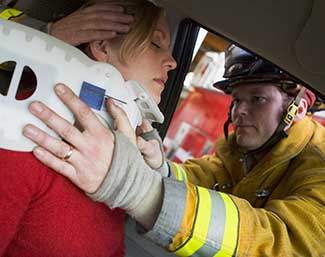Columbia Brain Injury Lawyer
Traumatic Brain Injury Resulting from a Car Accident
 Every year, tens of thousands of Missourians — 47,977 in 2014, the most recent year on record — get into a car accident. Many of those will suffer traumatic brain injury (TBI), a condition that can result in lost work, permanent disability, and death. According to statistics published by the Brain Injury Association of Missouri, 17 percent of TBIs are caused by car accidents, and 31.8 percent of all TBI deaths result from motor vehicle accidents and traffic-related incidents.
Every year, tens of thousands of Missourians — 47,977 in 2014, the most recent year on record — get into a car accident. Many of those will suffer traumatic brain injury (TBI), a condition that can result in lost work, permanent disability, and death. According to statistics published by the Brain Injury Association of Missouri, 17 percent of TBIs are caused by car accidents, and 31.8 percent of all TBI deaths result from motor vehicle accidents and traffic-related incidents.
TBIs are devastating for those who suffer from them and for their loved ones.
Physical and mental changes to a loved one can lead to doubt, confusion, and stress in the entire family, particularly if that person was the primary breadwinner. You need someone who will take on insurance companies to recover payment for treatments and who can be your vigorous advocate in the event that you decide to sue for wrongful death. But first, you need to be informed.
What You Need to Know About Traumatic Brain Injuries
The brain floats in a bath of cerebral fluid, protected by the skull’s hard shell. TBIs occur when this state of equilibrium is suddenly disrupted, in one of the following ways:
- Blunt force from an object fractures the skull, causing damage to the brain.
- The force of a sudden movement causes the brain to collide with the skull from the inside. This common type of TBI, called a diffuse axonal injury, often results from car accidents. The collision causes the body, which is restrained by a shoulder harness, to stop abruptly. The brain inside the skull continues moving until it slams against the inside of the head, causing swelling and nerve cell damage. This is also known as a “deceleration injury.”
When you or a loved one suffers from TBI, there may be no external sign of injury. Nevertheless, there are some common symptoms to look out for:
- Mild TBI may cause an individual to appear disoriented or lose consciousness for a moment. Other symptoms include ringing in the ears, nausea, dizziness, blurred vision, fatigue or lethargy, lightheadedness, and temporary confusion. These symptoms should resolve within a few days or weeks.
- In moderate or severe cases of TBI, people might experience any of the symptoms listed above, in combination with seizures, convulsions, slurred speech, dilated pupils, an inability to wake up after sleeping, numbness in the arms or legs, or impaired coordination.
- A classic TBI symptom is headache. It’s not uncommon to experience headaches for several weeks after mild trauma. If the headache persists and becomes increasingly stronger, however, the damage could be more severe.
A Potential Link Between Head Injuries and Dementia
 Dementia – the decline in mental ability that interferes with daily life – is an incurable condition. Types of dementia include Alzheimer’s disease, Parkinson’s disease, and vascular dementia, which occurs in some people following a stroke.
Dementia – the decline in mental ability that interferes with daily life – is an incurable condition. Types of dementia include Alzheimer’s disease, Parkinson’s disease, and vascular dementia, which occurs in some people following a stroke.
Doctors and scientists have identified factors that may increase the risk of dementia in elderly people, but they haven’t yet determined how to halt the progression of the disease. New research, however, has revealed a possible factor in dementia that might respond to treatment… read more
What to Do if You Have Been in a Car Accident
If you experience any symptoms of TBI, you should seek medical treatment right away. Scientists do not yet have a “cure” that will reverse damage caused by the initial trauma, but individuals who receive one head injury are at greater risk of incurring permanent damage through re-injury. Immediate treatment will involve steps to keep this from happening.
If the doctors suspect TBI after a routine examination, they will perform X-rays of your head and spine to assess damage. They may order a computed tomography (CT) scan if they believe that the injury is moderate or severe. Doctors will stabilize your head and spine and make sure that a proper flow of oxygen is reaching the brain to help prevent a condition called hypoxia, where the brain is starved of oxygen.
After treatment, you may receive an individually tailored program of rehabilitation to repair damage to speech, movement, or memory.
TBIs are expensive. The Brain Injury Association of Missouri estimates that, all told, the cost to society exceeds $76.5 billion a year. You may need money for hospitalization, testing, and physical and occupational therapy. You may also need to recover money due to lost wages and emotional distress.
Seek Professional Help that You Can Trust
In the state of Missouri, you have five years to file suit to claim damages that result from TBI. You can recover payment for lost wages, both current and estimated future medical expenses, permanent disability, the cost of hiring a caregiver, and emotional distress.
In order to have a successful case, you must be able to show that the driver responsible for the car accident was both negligent and failed to use reasonable care. It is crucial not only to document the injury but also to make sure that you contact an attorney, one who has experience in serious personal injury cases involving brain injuries. The legal team of Bley & Evans Attorneys at Law understand what it takes to win significant damages for those who have been significantly harmed by others. Call them without delay if your loved one suffered a TBI in Missouri — 844-443-8385.















